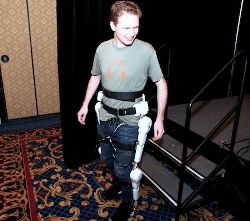Jan 20 2011
Japanese company Cyberdyne has developed a robotic suit called the Hybrid Assistive Limb or HAL. It is an exoskeleton and is designed to help the disabled or elderly persons to gain mobility.
 Hybrid Assistive Limb
Hybrid Assistive Limb
The product was showcased recently at the Consumer Electronic Show in Las Vegas. Evan Ackerman, a technology journalist from the US wore the suit and demonstrated its functionality. The HAL responds to signals emitted by the nerves in the leg. The solution can also be used by soldiers to give them some extra strength.
Cyberdyne has been founded by Yoshiyuki Sankaim, professor and head of the Cybermics Lab at the University of Tsukuba, who wanted to commercialize it after almost ten years of research and development on the HAL.
The company has been hiring out the product to hospitals and conducting various tests on its own. The US military has also evinced keen interest in the product, saying that it would like to test it on soldiers.
The suit has a lightweight frame for the body, and is operated with electric motors, which simulate muscles that help strengthen the weak limbs. The whole suit weighs around 10 Kg. Although the suit has been displayed by the company at various shows, it has been worn only by its employees or a few select patients. Although the company has also developed robotic arms, only the legs were displayed at the show.